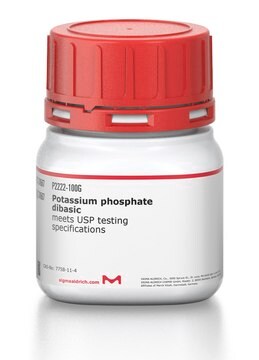1551139
USP
Monobasic potassium phosphate
United States Pharmacopeia (USP) Reference Standard
Synonym(s):
Potassium phosphate monobasic, Monopotassium phosphate, Potassium dihydrogen phosphate, prim.-Potassium phosphate
About This Item
Recommended Products
grade
pharmaceutical primary standard
API family
monobasic potassium phosphate
manufacturer/tradename
USP
pKa (25 °C)
(1) 2.15, (2) 6.82, (3) 12.38 (phosphoric acid)
mp
252.6 °C (lit.)
density
2.338 g/mL at 25 °C (lit.)
application(s)
pharmaceutical (small molecule)
format
neat
SMILES string
[K+].OP(O)([O-])=O
InChI
1S/K.H3O4P/c;1-5(2,3)4/h;(H3,1,2,3,4)/q+1;/p-1
InChI key
GNSKLFRGEWLPPA-UHFFFAOYSA-M
Looking for similar products? Visit Product Comparison Guide
Related Categories
General description
Application
Analysis Note
Other Notes
related product
Storage Class Code
11 - Combustible Solids
WGK
WGK 1
Flash Point(F)
Not applicable
Flash Point(C)
Not applicable
Choose from one of the most recent versions:
Certificates of Analysis (COA)
Sorry, we don't have COAs for this product available online at this time.
If you need assistance, please contact Customer Support.
Already Own This Product?
Find documentation for the products that you have recently purchased in the Document Library.
Customers Also Viewed
Protocols
EPA Method 547 outlines the analysis of glyphosate in drinking water by direct aqueous injection HPLC, post column derivatization, and fluorescence detection
Our team of scientists has experience in all areas of research including Life Science, Material Science, Chemical Synthesis, Chromatography, Analytical and many others.
Contact Technical Service


